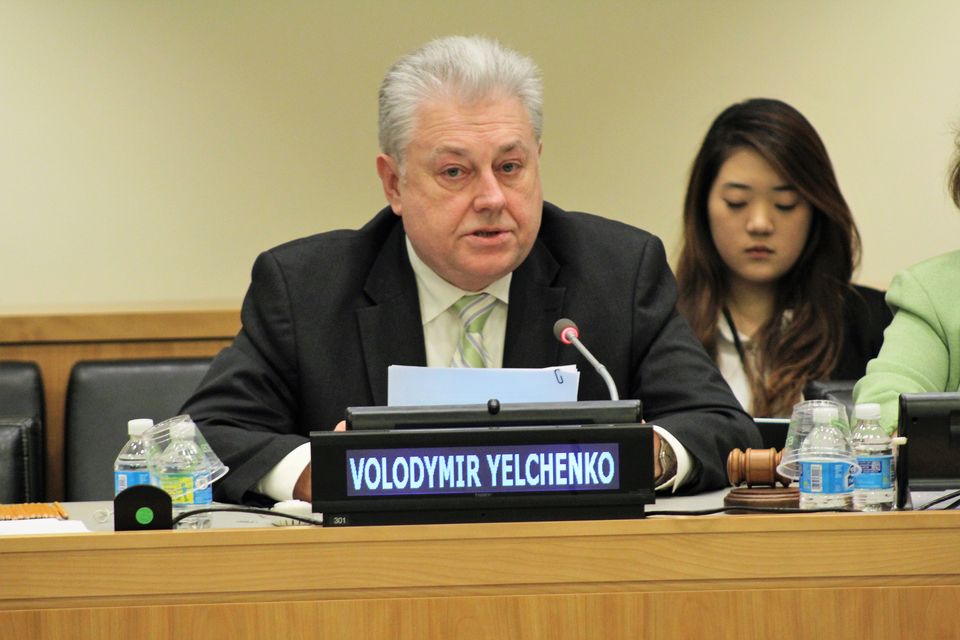Виступ Володимира Єльченка на міжнародній конференції ООН "Здоров'я та довкілля"

Excellencies,
Dear colleagues,
Distinguished guests,
At the outset, let me thank Doctor Christine Durbak of the World International Transfer, Conference Chair and Founder, for being our supporter and partner for so many fruitful years.
Let me also express my sincere appreciation to Mr. Juwang Zhu, Director, Division for Sustainable Development of the United Nations Department of Economic and Social Affairs for their continued co-sponsorship of our Conferences. And I would also like to welcome our distinguished speakers of today.
Dear colleagues,
I am pleased that Ukraine has a long lasting tradition of co-hosting this essential open dialogue at the United Nations, that give us an opportunity to discuss a number of the most relevant items of the international, national and regional importance.
As Doctor Durbak already mentioned, this year our focus is in conjunction with the UN 2030 agenda targeting Sustainable Development Goal 14 - Conserve and sustainably use the oceans, seas and marine resources for sustainable development.
Oceans, seas and their resources underpin the well-being of humanity and the health of our ecosystems. They are essential to poverty eradication, food security, trade, economic growth and the supply of water and oxygen, while also serving as the primary regulator of the global climate and an important sink for greenhouse gases.
Moreover, all states should be strongly committed to the UNCLOS – the constitution of the oceans, which reflects customary international law and establishes the overarching legal framework for all activities in oceans and seas.
The States Parties to the UNCLOS have recognized the desirability of establishing through this Convention, with due regard for the sovereignty of all States, a legal order for oceans and seas which will facilitate international communication, and will promote the peaceful use of oceans and seas, the equitable and efficient utilization of their resources, the conservation of their living resources, and the study, protection and preservation of the marine environment.
Unfortunately, nowadays the UNCLOS legal order faces great challenges in Ukraine and its adjoining maritime areas. In view of the occupation of the Autonomous Republic of Crimea and city of Sevastopol by RF, Ukraine’s rights as the coastal state in maritime zones adjacent to Crimea in the Black Sea and Kerch Strait have been interfered and usurped by the aggressor state.
Dear colleagues,
The approach of the new United Nation system must ensure comprehensive consideration of security, social and environmental aspects, particularly in priority areas such as ecological safety, comprehensive environmental conservation and risk reduction management. Only such approach will facilitate sustainability and efficiency of developing world.
In this regard, I would like to recall that this month the international community will also commemorate the 31st year of the Chornobyl disaster.
This catastrophic nuclear accident occurred on 26 April 1986 at the Chornobyl Nuclear Power Plant in the town of Prypyat, in Ukraine, which was under the direct jurisdiction of the central authorities of the Soviet Union. The Chornobyl disaster was the worst nuclear power plant accident in history in terms of cost and casualties.
This disaster had a serious political and security impact and changed attitudes towards many aspects of the day-to-day life, in particular to the nuclear energy industry and its safeguards. For Ukraine in its modern history the scale of the catastrophe can be compared only to the Famine of 1933 (Holodomor), Second World War and ongoing Russian aggression.
For 31 years Ukraine has made every effort to improve the well-being of affected communities and revive the afflicted districts’ economic potential. This catastrophe disrupted the livelihoods of almost 2 million people in more than 2000 affected locations. Strengthening the resilience of affected communities and restoration of their self-reliance is the foundation for their sustainable development and our utmost priority.
By all means, the shift from restoration of the area to its sustainable socio-economic development can only take place if radiation safety requirements are fully met. Therefore, Ukraine has been placing emphasis on converting the Shelter facility into an environmentally safe system and concluding the construction of the New Safe Confinement. As a result, last November the New Safe Confinement was completed. This construction project is unprecedented in the history of engineering. Never before has such a huge structure been constructed at a heavily contaminated site.
Understanding the long-term nature of the implications of the Chornobyl accident, we find it essential to continue collaboration with the United Nations and other international organizations regarding the study and minimization of health, environmental and socio-economic consequences of the disaster.
Ukraine firmly believes that goal-oriented cooperation of all government agencies, non-governmental and international organizations will result in long-term solutions to complex problems triggered by the disaster.
Dear colleagues,
I tried to shape the main ideas of the Ukrainian delegation in the United Nations on relevant issue and now I guess that it is time to listen to the views and approaches of my colleagues.
Thank you.
